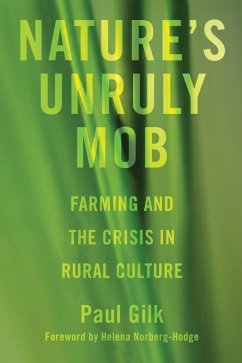
Nature's Unruly Mob (eBook, ePUB)
Farming and the Crisis in Rural Culture

PAYBACK Punkte
7 °P sammeln!
Growing up in the mostly wooded rural countryside of northern Wisconsin, in the decades immediately after the Second World War, meant immersion in cultural transformation. An economy of subsistence and self-provisioning was rapidly becoming industrialized and commercial. The culture of the local and small-scale was being overpowered by the metropolitan and large-scale. This experience provided the practical groundedness for exploring the decline and even the demise of small-scale farming, not just in northern Wisconsin, but as an example and illustration of how industrialization and globalizat...
Growing up in the mostly wooded rural countryside of northern Wisconsin, in the decades immediately after the Second World War, meant immersion in cultural transformation. An economy of subsistence and self-provisioning was rapidly becoming industrialized and commercial. The culture of the local and small-scale was being overpowered by the metropolitan and large-scale. This experience provided the practical groundedness for exploring the decline and even the demise of small-scale farming, not just in northern Wisconsin, but as an example and illustration of how industrialization and globalization undermine local rural culture everywhere. Linked with an ecological critique that asserts the unsustainability of globalized industrialism, the exploration into the meaning of rural culture took on larger significance, especially when seen in relation to the collapse of all prior civilizations. In addition, the investigation into the origins of civilization revealed the predatory relationship civilization developed in regard to agriculture and rural life. The rampant globalization of civilization results in the destitution and impoverishment of agrarian culture. The question then becomes whether civilization has finally achieved the technical mastery by which to protect and extend itself permanently or whether its complexity only assures a more catastrophic collapse or whether civilization may learn to be flexible enough to merge with an essentially noncivilized folk culture to create a new cultural sensibility that enhances the best of both worlds. This is the question the entire world is now facing. Weapons of mass destruction, climate change, and peak oil all combine the force a resolution to this dilemma.
Dieser Download kann aus rechtlichen Gründen nur mit Rechnungsadresse in A, D ausgeliefert werden.



